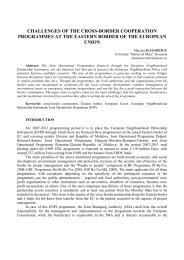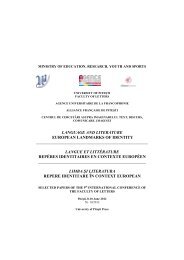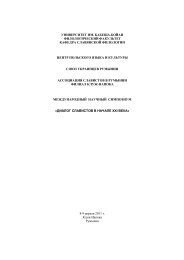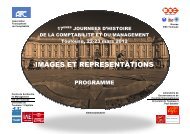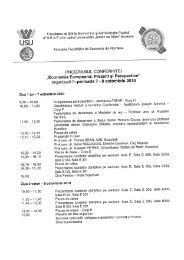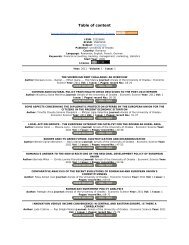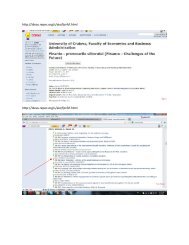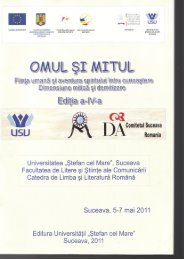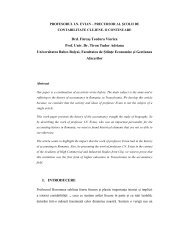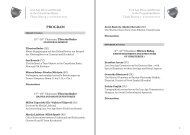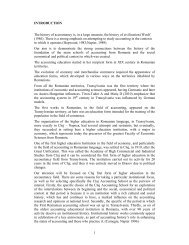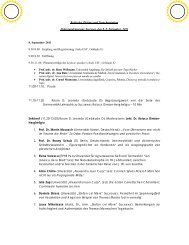Hume on miracles and the Lourdes phenomenon Alexandru Anghel
Hume on miracles and the Lourdes phenomenon Alexandru Anghel
Hume on miracles and the Lourdes phenomenon Alexandru Anghel
Create successful ePaper yourself
Turn your PDF publications into a flip-book with our unique Google optimized e-Paper software.
eas<strong>on</strong>ing:<br />
(a) <str<strong>on</strong>g>Hume</str<strong>on</strong>g> begins his argument by a cauti<strong>on</strong>ary remark c<strong>on</strong>sidering <strong>the</strong> fallibility of causal<br />
Though experience be our <strong>on</strong>ly guide in reas<strong>on</strong>ing c<strong>on</strong>cerning matters of fact; it must be<br />
acknowledged, that this guide is not altoge<strong>the</strong>r infallible, but in some cases is apt to lead us into<br />
errors. . . . All effects follow not with like certainty from <strong>the</strong>ir supposed causes. Some events are<br />
found, in all countries <strong>and</strong> all ages, to have been c<strong>on</strong>stantly c<strong>on</strong>joined toge<strong>the</strong>r: O<strong>the</strong>rs are<br />
found to have been more variable, <strong>and</strong> sometimes to disappoint our expectati<strong>on</strong>s; so that, in our<br />
reas<strong>on</strong>ings c<strong>on</strong>cerning matter of fact, <strong>the</strong>re are all imaginable degrees of assurance, from <strong>the</strong><br />
highest certainty to <strong>the</strong> lowest species of moral evidence (<str<strong>on</strong>g>Hume</str<strong>on</strong>g>, [1748]2007:110).<br />
The “degrees o assurance” menti<strong>on</strong>ed by <str<strong>on</strong>g>Hume</str<strong>on</strong>g> in this passage refer to events in our<br />
experience that have a higher or <strong>the</strong> highest degree of certainty, for example <strong>the</strong> fact that <strong>the</strong><br />
chair I sat <strong>on</strong> a few minutes ago will not break down if I sit <strong>on</strong> it now (an event with a high<br />
degree of probability) <strong>and</strong> <strong>the</strong> fact that sun will rise tomorrow morning (an event with <strong>the</strong> highest<br />
degree of probability); <strong>and</strong> events which “represent <strong>the</strong> lowest species of moral evidence”, moral<br />
evidence referring here to undetectable human motivati<strong>on</strong>s. The latter category comprehends<br />
different testim<strong>on</strong>ies <strong>and</strong> <strong>the</strong> kind of experience that is c<strong>on</strong>trary to <strong>the</strong> order of things observed,<br />
for example <strong>the</strong> sightings of an UFO.<br />
So, for <str<strong>on</strong>g>Hume</str<strong>on</strong>g> <strong>the</strong>re is no absolute certainty that <strong>the</strong> chair will not broke down or even that<br />
<strong>the</strong> sun will rise tomorrow. There is no rati<strong>on</strong>al guarantee that <strong>the</strong> world as we know it now will<br />
be <strong>the</strong> same way in <strong>the</strong> next minute. All our beliefs about our mind, our body <strong>and</strong> <strong>the</strong> world are<br />
based <strong>on</strong> past experience, our own past experience – though this last idea in not quite exact,<br />
c<strong>on</strong>sidering <strong>the</strong> fact that not all our underst<strong>and</strong>ing of <strong>the</strong> world is derived <strong>on</strong>ly from our<br />
experience: we learn also form <strong>the</strong> experiences of o<strong>the</strong>rs (for example, if we didn’t learn from<br />
“And what have we to oppose to such a cloud of witnesses, but <strong>the</strong> absolute impossibility or miraculous nature of<br />
<strong>the</strong> events, which <strong>the</strong>y relate? And this surely, in <strong>the</strong> eyes of all reas<strong>on</strong>able people, will al<strong>on</strong>e be regarded as a<br />
sufficient refutati<strong>on</strong>.” (<str<strong>on</strong>g>Hume</str<strong>on</strong>g>, [1748]2007: 125) According to this interpretati<strong>on</strong>, we must ei<strong>the</strong>r discard <strong>the</strong> law <strong>and</strong><br />
admit that such a law of nature is inexistent since it was falsified, or reformulate it to include <strong>the</strong> new facts<br />
discovered. Or we could simply deny <strong>the</strong> possibility of <strong>the</strong> alleged miracle (see Flew 1961:186-187, 200-209). This<br />
interpretati<strong>on</strong> totally discards <str<strong>on</strong>g>Hume</str<strong>on</strong>g>’s enterprise in secti<strong>on</strong> X of his Enquiry C<strong>on</strong>cerning Human Underst<strong>and</strong>ing, in<br />
which, as we shall see, he tries to probe <strong>and</strong> asses <strong>the</strong> trustworthiness of <strong>the</strong> particular sort of testim<strong>on</strong>y which is<br />
invoked in favor of <strong>miracles</strong>.



